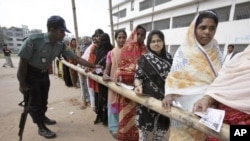U.S. Ambassador-at-large for Global Women's Issues Melanne Verveer recently visited Dhaka, Bangladesh, where she met with government and civil society leaders about advancing the rights and well-being of women and girls.
During her stay, Ambassador Verveer addressed such issues as child marriage, maternal and child health, women's political and economic participation, and gender-based violence. She also observed how Bangladesh continues to be a strong center of social entrepreneurship, which helps women become agents of change.
"On my visit to a Grameen village, I was reminded once again of the extraordinary transformative power of investing in women through microfinance,” said Verveer. “All the women who had received loans showed that when women have access to resources, they can truly transform their lives and the lives of their families and communities."
Bangladesh is perhaps unique in the developing world as a country where women hold many of the leading positions in government. Moreover, the country has succeeded in bringing down child and maternal mortality over the past two decades. The government moved in May 2011 to make inheritance laws more equitable to female beneficiaries, as part of the country’s Women’s Development Policy.
Yet despite these gains, societal problems, including violence against women, continue to hamper the lives of too many women. In 2010, Parliament passed a bill criminalizing domestic violence, but critics have doubts about the Government’s ability to effectively implement the law. Most efforts to combat domestic violence are funded by nongovernmental organizations, or NGOs, with little assistance from the government.
Educating religious leaders on the consequences of child marriage, increasing efforts to keep girls in schools, as well as offering economic incentives to parents are key ways to help communities abandon the practice of child marriage. Two-thirds of victims of acid attacks, a cruel practice designed to cripple victims for life, are women. According to the most recent State Department Human Rights Report, dowry-related killings increased during 2010.
"Violence against women and girls is a crime," Ambassador Verveer said, "not something private or cultural." Countries, including Bangladesh, have an obligation to implement and enforce laws, because no country can progress by leaving half of its people behind.
Despite gains, societal problems, including violence against women, continue to hamper lives.




